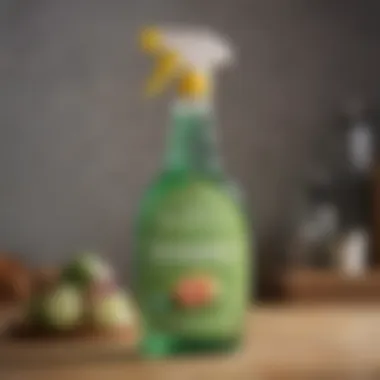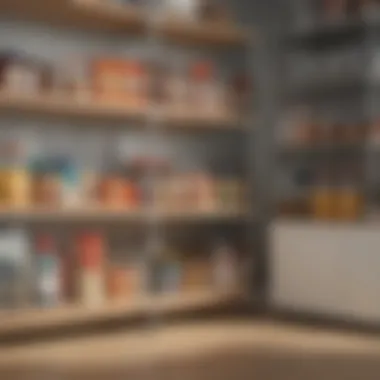Exploring Homemade Cleaning Solutions: A Complete Guide


Intro
In today's fast-paced world, cleanliness is essential. Many individuals seek ways to keep their living spaces in order without compromising their health or the environment. Homemade cleaning solutions rise as practical, effective alternatives to common commercial products. These DIY options, often made from readily available ingredients, not only reduce the chemical exposure typically associated with store-bought cleaners, but they also offer an eco-friendly approach to household tasks.
This guide will navigate the depth of creating homemade cleaners. It comprehensively discusses essential ingredients, practical recipes, and safety considerations that are important for anyone wanting to adopt or enhance their cleaning regimen. As we explore these aspects, it becomes evident how simple changes can lead to more sustainable and healthier cleaning habits.
Recipe Overview
Making your own cleaning solutions can be straightforward. Not only does it initiate connection to one's home environment, but it fosters a greater understanding of what you use on surfaces your family interacts with daily. Here are key elements to consider as we delve further into the solutions you can create:
- Natural All-Purpose Cleaner
- Yields: Approximately 2 cups
- Prep Time: 5 minutes
- Difficulty: Easy
- Main Ingredients Used:
- White vinegar
- Water
- Essential oils (optional for fragrance)
Step-by-Step Instructions
Creating a natural all-purpose cleaner involves a few simple steps:
- Gather supplies: You will need a spray bottle, white vinegar, water, and essential oils if desired.
- Prepare the mixture:
- Transfer to a spray bottle: Make sure your spray bottle is clean before transferring the mixture.
- Mix equal parts of white vinegar and water. For the standard two-cup recipe, you'll combine one cup of vinegar and one cup of water.
- Add 10-15 drops of essential oils for scent, such as lemon or tea tree oil.
Optional tips: A funnel can streamline this process. Also, if you want a stronger scent, adjust the essential oil amounts based on preference.
Safety Considerations
Homemade cleaners enhance the ability to control what enters your breathing space. Always label your DIY bottles clearly. Ensure storage out of reach of children and pets. Mixing vinegar with bleach causes harmful gases, so avoid combining cleaning agents.
Storage Tips
Store your homemade cleaners in a cool, dark place. Similar to food, exposure to light and heat can degrade the effectiveness of the ingredients over time. When making in larger quantities, remember to shake the bottle gently before use to maintain a consistent mixture.
Understanding these fundamentals lays the foundation to venture into specific cleaning solutions throughout your home, assuring you achieve a pristine space efficiently and sustainably.
Preface to Homemade Cleaning Solutions
Homemade cleaning solutions have gained popularity as people grow more conscious about safety and the environment. Understanding homemade cleaners can empower individuals to make informed choices about the products they use in their homes. This section explores their significance.
Definition and Overview
Homemade cleaning solutions refer to cleaning agents that are crafted at home using natural ingredients. Unlike commercial cleaners, which may contain harsh chemicals, homemade cleaners often utilize common household items such as vinegar, baking soda, and essential oils. These solutions aim to address diverse cleaning challenges while promoting safety and sustainability.
The concept of crafting one's own cleaning agents, while not new, has resurged as more individuals look for alternatives that are effective yet gentle on health and the planet. Many dads and moms are now back-to-basics, rediscovering traditional methods combined with some modern twists for convenience.
Benefits of Homemade Cleaners
The benefits of using homemade cleaners are varied and notable:
- Cost-Effectiveness: Homemade solutions can often be created using items you already have at home, which is more economical than purchasing bottles of commercial cleansers.
- Healthier Ingredients: Many are sensitive to chemicals in commercial products. Homemade options allow control over what goes into them, leading to fewer allergic reactions or respiratory issues.
- Personalization: Recipes can be adapted according to individual needs, allowing for adjustments in strength, scent, or suitability for specific cleaning tasks.
With such advantages, it's easy to see why families are increasingly turning to these alternatives.
Environmental Impact
The environmental impact of using homemade cleaning solutions cannot be overlooked.


Many traditional cleaning products contain toxic substances that can harm aquatic life and pollute local ecosystems All while being inconsistent in their effectiveness. Conversely, homemade cleaners usually involve biodegradable components that break down without leaving harmful residues.
Moreover, opting for these solutions can reduce plastic waste stemming from single-use commercial packaging. Thus, each contribution counts towards a larger goal of environmental sustainability.
It is vital that households recognize their potential influence on our planet. Embracing safer cleaning habits benefits not only the home but also contributes to broader environmental welfare.
Overall, exploring homemade cleaning solutions allows individuals to engage in responsible consumer habits while maintaining a clean and healthy home environment.
Key Ingredients for Homemade Cleaning Solutions
The significance of using homemade cleaning solutions cannot be overstated in today’s environmentally conscious society. Using key ingredients enhances effectiveness while minimizing the toxic load on the environment. The simplicity and availability of these ingredients also contribute to their popularity. Several components stand as the cornerstone to crafting efficient, safe, and budget-friendly cleaning solutions.
Vinegar
Vinegar, particularly white distilled vinegar, is an exceptionally versatile ingredient appreciated for its cleaning utility. Its high acidity enables it to break down mineral deposits, grime, and dirt effectively. Many users find it great for glass, countertops, and even deodorizing spaces. Beyond just being a cleaner, its antibacterial properties allow it to eliminate bacteria and viruses. An essential tip is to dilute vinegar with water, as this enhances its applicability across various surfaces without damaging materials like wood.
Benefits of Using Vinegar
- Cuts through grease and grime effortlessly.
- Naturally disinfects; therefore doesn't likely introduce harmful chemicals to indoor spaces.
- Economical and accessible at local supermarkets; rarely costs much.
Baking Soda
Baking soda, or sodium bicarbonate, serves more uses than just a baking agent. It acts as a mild abrasive, making it excellent for scrubbing surfaces intuitively and safely without leaving scratches. A solution containing baking soda and water creates a paste that assists in the removal of stains from carpets and upholstery. In addition to cleaning, baking soda also neutralizes odors, making it valuable in maintaining a fresh and clean environment.
Baking soda can also be used in refrigerators to absorbing unwanted odors effectively.
Expected Advantages of Baking Soda
- Acts as a deodorizer, especially for musty smells.
- Helps to clean surfaces effectively without harsh scratching chemicals.
- Helps to maintain clean air by combating odors around the home.
Essential Oils
Essential oils provide more than pleasant aromas; they bring notable natural antimicrobial properties that improve the vitality of homemade cleaning mixtures. Different oils, such as tea tree oil, lavender oil, and peppermint oil, are infused into mixtures to impact cleaning efficacy positively. The uplifting scents often enhance one's cleaning experience, transforming it from a tedious chore to a fragrant task. When incorporating essential oils into cleaning solutions, individuals should ensure not to use too much, as a drop or two can largely suffice.
Valuable Characteristics of Essential Oils
- Provide delightful fragrances that are natural rather than artificial.
- Often possess antibacterial and antiviral properties enhancing cleaning prowess.
- Can help elevate moods, often leading to a more refreshing environment.
Castile Soap
Castile soap is another noteworthy ingredient for home cleaning solutions. Originating from olive oil, it is plant-based, biodegradable, and non-toxic. This is pivotal for anyone looking to settle into eco-friendliness within their households. Not only can castile soap work as a powerful cleaner, it's also mild, making it suitable for a variety of surfaces and safe for children and pets. Many add additional essential oils to blend the benefits of soap with delightful, calming scents, creating a potent, homemade cleaning solution suits a range of need.
Essential Features of Castile Soap
- Highly adaptable; use it for floors, kitchens, and even laundry.
- Fragile for the environment; easily biodegradable.
- Safe for human and pet contacts, relieving concerns over allergic reactions.
In summary, the key ingredients explored lend credibility and efficiency to homemade cleaning solutions. Each ingredient has essential characteristics that significantly improve equivalent store-bought cleaners, offering not just economic advantages but also positive environmental impacts. Incorporating these elements serves a multitude of perspectives, from cleaning efficacy to personal and ecological health.
Popular Homemade Cleaning Solutions and Recipes
Homemade cleaning solutions have garnered considerable attention due to their efficiency and environmental safety. The formulations come from easily available ingredients. Consumers and eco-conscious individuals show increasing interest in natural options. Developing your own cleaners allows for control over ingredients, effectiveness, and safety.
Using homemade solutions can be cost-effective. Store-bought products come with added charges for branding and packaging. By making cleaning solutions on your own, you eliminate these unnecessary costs. Furthermore, many commercial cleaners contain toxins that may affect health. Homemade cleaners usually use natural and fewer toxic ingredients.
In this section, specific recipes for common homemade cleaners will be discussed. It includes key recipes that anyone can easily try. Using these easy solutions not only spark practicality but can also deepen your understanding of cleaning formulations.
All-Purpose Cleaner


An all-purpose cleaner serves as a versatile solution for various surfaces. It can tackle kitchen counters, bathroom spaces, and other everyday cleaning needs effectively. A popular formula incorporates simple ingredients like vinegar and water.
Recipe for All-Purpose Cleaner
- 1 cup white vinegar
- 1 cup water
- Optional: a few drops of lemon juice or an essential oil for fragrance
Mix these ingredients together. Pour into a spray bottle for convenient use. When applying, spray and wipe with a cloth. The vinegar helps cut through grime while lemon or essential oils add pleasant scents.
Glass Cleaner
Cleaning glass may often require a special solution that avoids streaks. A common homemade glass cleaner combines vinegar and alcohol for effective results. This formulation allows for a clean finish while also being safe for home use.
Recipe for Glass Cleaner
- 1 cup water
- 1 cup vinegar
- 1 cup rubbing alcohol
Mix all the ingredients in a spray bottle. Spray onto surfaces and wipe down with a microfiber cloth to remove streaks. This mixture leaves windows spotless and streak-free.
Floor Cleaner
Floor cleaning often requires a dedicated cleaner that handles different types of flooring without damage. This recipe is suitable for most surfaces, effectively lifts dirt without leaving residue. It is a sustainable alternative to commercial floor cleaners.
Recipe for Floor Cleaner
- 1 gallon hot water
- 1 cup vinegar
- Optional: a few drops of castile soap
Combine all components in a bucket. Use a mop to apply the solution on floors. After mopping, allow floors to air dry. This mixture not only cleans effectively but also keeps flooring in better condition over time.
Bathroom Cleaner
Given the specific cleaning needs of bathrooms, a designated solution can simplify the task. Many rely on baking soda's natural abrasive qualities combined with liquid soap. The result is a powerful cleaner that combats soap scum and other grime.
Recipe for Bathroom Cleaner
- 1 cup baking soda
- 1/4 cup liquid castile soap
- 1/2 cup vinegar
Mix these ingredients to create a paste. Apply to surfaces like sinks, tubs, and toilets. Scrub and rinse thoroughly. This cleaner is inexpensive while being effective in hostile environments typical in bathrooms.
Homemade cleaners provide environmental benefits and can enhance quality of cleaning tasks. Simple recipes and understanding each solution's purpose promote a greater appreciation for homemade sustainability. Relying on these concoctions well supports the ongoing move toward a cleaner planet.
Safety Considerations for Homemade Cleaners
Homemade cleaners offer a practical and ecological alternative to commercial products. However, security is vital in their creation and use. This section examines essential safety factors regarding homemade cleaning solutions, helping users to navigate potential hazards. Safety is not merely about protecting oneself, but also about ensuring the effectiveness of the cleaning products.
Handling Ingredients Safely
Using household ingredients like vinegar or baking soda requires careful handling. Although largely considered safe, improper use can lead to mixed reactions with especially potent substances. For example, never combine vinegar with bleach, as this can produce harmful fumes. When working with any materials, remember to read labels and understand what each ingredient contributes towards the solution you are creating.
Measures like using gloves and working in a well-ventilated space can promote safety during the cleaning solution preparations. Ensure that all powders like baking soda, when used, do not enter the nostrils. They might cause respiratory irritations. Always measure carefully, using distinctly labeled containers to avoid mishaps.
Storage Guidelines
Correct storage of homemade cleaners prolongs their effectiveness and ensures safety. These solutions should be kept in tightly sealed bottles, marked with ingredient lists and expiration dates. Glass containers are preferred over plastic, especially when essential oils are included, as these oils can degrade certain plastics over time.
Store cleaning solutions away from direct sunlight and moisture. Ensure the product is out of reach of children and pets to prevent accidental ingestion or other mishaps. Regularly check for changes in smell or appearance, indicating spoilage. If any signs of spoilage present, it is safer to dispose of the solution promptly rather than risk using a compromised cleaner.
Testing for Allergies
This is a crucial step when utilizing homemade cleaning solutions. Natural does not always mean hypoallergenic. Essential oils, while often beneficial and fragrant, can trigger allergic reactions in sensitive individuals. Before full-scale use, test a small amount of the cleaner on inconspicuous surfaces.
Additionally, conducting a patch test on skin can prevent irritations or allergic responses. To execute this, apply a small drop of the cleaner on a hidden area and wait 24 hours for any delayed reactions to appear. If no adverse reactions occur, it is likely safe to use. This proactive approach allows individuals to enjoy the benefits of homemade cleaners without compromising their health.
Always prioritize safety when dealing with DIY products. Not everything
Efficiency of Homemade Solutions


Homemade cleaning solutions have become ever more popular, and their efficiency plays a key role in this trend. Understanding how these DIY cleaners contrast with store-bought alternatives reveals much about their worth. Formulating cleaning solutions at home often leads to a dual advantage: eco-friendliness and substantial cost savings. This efficiency brings forth both tangible and intangible benefits for users.
Comparing Store-bought vs.
Homemade
When discussing cleaning efficiency, it's essential to analyze the differences betwen store-bought and homemade options.
- Ingredients: Store-bought products may contain chemicals that are not only potentially harmful but also unnecessary. On the other hand, homemade solutions typically use simple, natural substances like vinegar and baking soda, which are known for their cleaning properties.
- Efficacy: Many users find that homemade cleaners can be surprisingly effective. They often provide similar, if not better, results when it comes to tackling common stains and dirt. Vinegar, for example, can cut through grease effectively, while essential oils can leave surfaces smelling nice.
- Customization: Homemade solution allows users to tailor cleaners to specific needs. If a particular surface demands more gentle handling, users can adapt their formulas accordingly. This level of custom control is immediate with homemade cleaners.
- Health Concerns: A significant advantage of homemade cleaners is the reduction of potentially dangerous substances. Store-producset commonly include fragrances or other additives that cause skin irritation or allergic reactions. With homemade solutions, users can avoid these compounds entirely.
The rise in awareness about health and environmental impacts has fueled interest in homemade options, often proving to be both efficient and safe.
Time and Cost Effectiveness
The time and cost effectiveness of homemade cleaning solutions significantly enhances their appeal. When balancing expenses against cleaning efficiency, multiple factors come into play.
- Initial Investment: Building a stock of essential ingredients requires a small investment, but these substances last a long time. In contrast, purchasing specialized cleaning products can add up quickly.
- Cost Over Time: Once stocked, typical homemade ingredients can yield an inserted number of cleaning solutions. A gallon of vinegar, for instance, could make numerous batches of cleaner equivalet. This sets a distinct financial benefit over repetitive small purchases from stores.
- Simplicity in Preparation: Many written recipes for homemade cleaners call for straightforward steps and minimal equipment. Some solutions can be mixed in just a few minutes, proving their time efficiency. Unlike the cleanup process that exists with some store brands, the removed time for setting up and waiting for refrigerated items is measurably less with most homemade recipes.
- Avoiding Waste: Homemade solutions, focusing on natural ingredients, often come with less packaging. This not only contributes to minimizing landfill waste, adding an implicit time save for recycling and disposal, but also aligns with a more sustainable approach.
In summary, the efficiency of homemade cleaning solutions remains relevant. Their potency and cost-saving potential reflect evolving consumer attitudes towards sustainability, health, and practicality. As individuals seek viable alternatives, each homemade cleaner can reveal how efficient DIY practices can transform ordinary cleaning tasks.
Real-Life Applications of Homemade Cleaners
Homemade cleaning solutions serve practical purposes in everyday life. Understanding their applications reinforces the positive impacts of using such formulations. These products offer an effective way to maintain cleanliness in various spaces while promoting sustainability. Additionally, homemade cleaners provide benefits that extend beyond basic cleaning tasks, such as enhancing indoor air quality.
Home Use Cases
In home settings, the versatility of homemade cleaners is notable. For cleaning the kitchen, a simple mixture of vinegar and baking soda can effectively deodorize, while essential oils like lemon can restore freshness. Similarly, using Castile soap is advantageous for scrubbing grime off surfaces.
- Common areas that benefit from homemade solutions include:
- Kitchens
- Bathrooms
- Living rooms
Utilizing safe and non-toxic ingredients aligns with a conscientious approach to household management. Therefore, cleaners made from baking soda can tackle stubborn stains on fabrics or carpets. Additionally, a diluted vinegar solution is superb for glass and mirrors, leaving them streak-free. When considering homemade cleaners, preparation does not demand substantial dedicating time, making it suitable for busy lifestyles.
Office and Workspace Cleanliness
Moving beyond home applications, the office and workplace greatly benefit from the utilization of homemade cleaning solutions. Environments in which individuals work should promote both hygiene and productivity. Employees feel more at ease in clean surroundings. A solution consisting of equal parts vinegar and water can ensure well-maintained desks and office spaces.
Using homemade cleaners reduces a reliance on commercial products, which often contain harsh chemicals that could trigger allergies or pollutants in enclosed areas. Encouraging a workplace culture that invests in homemade cleaner applications also aligns with modern sustainable practices. Managers can guide employees in preparing cleaning solutions tailored to office needs, creating an environmentally aware work culture.
- Practical benefits for office settings include:
- Healthy work environment
- Reduced environmental impact
- Cost-effectiveness through DIY solutions
Adopting homemade cleaners offers a path to communal effort, where employees collaborate to maintain their space. Simple actions, like conspicuously labeling rearranged storage spaces or properly disposing of trash, foster teamwork.
Culmination: The Future of Cleaning Solutions
The realm of cleaning solutions is evolving, with a pronounced shift towards sustainable and effective options. This article aims to crystallize the importance of homemade cleaning solutions in contributing to a healthier environment and improving general well-being. As society becomes increasingly aware of the negative impacts of commercial cleaning products, neglecting this trend can yield detrimental consequences.
Sustainability and Trends in Cleaning
Sustainability in cleaning is not merely a trend, but rather an essential approach in modern life. The rising prevalence of synthetic chemicals in commercial cleaners has prompted consumers to reconsider their choices. Homemade cleaning solutions, primarily made from natural ingredients, lead to reduced chemical exposure and lower environmental pollution. Moreover, there is a growing trend in utilizing eco-friendly ingredients such as vinegar, baking soda, and essential oils. These alternatives help achieve effective cleaning results while minimizing the carbon footprint.
Utilizing trending substances like citrus peels or respiratory-friendly oils is gaining traction. These ingredients not only contribute to efficient cleaning but also leave behind a pleasant, natural scent. Citizens adapting to public sentiment towards sustainability find that pivoting to homemade solutions presents both an ethical and efficient choice.
"With the increasing accessibility of information, consumers today embrace diverse sustainable cleaning options directly tied to their personal values."
Encouraging a Sustainable Lifestyle
Adopting homemade cleaning solutions fosters a sustainable lifestyle directly. Simple practices, such as using reusable containers for ingredients and biodegradable packaging, contribute to reducing waste. Initiatives promoting this lifestyle manifest in communities advocating for birth homemade cleaning kits rather than using single-use products. Educational resources, like workshops on making these solutions, further enhance awareness and practical knowledge.
Community participation in sustainability can bolster friendships as well. Worker cooperatives, local markets, and online collects provide avenues for sharing information and supplies, appreciating a shared responsibility towards environmental health.







